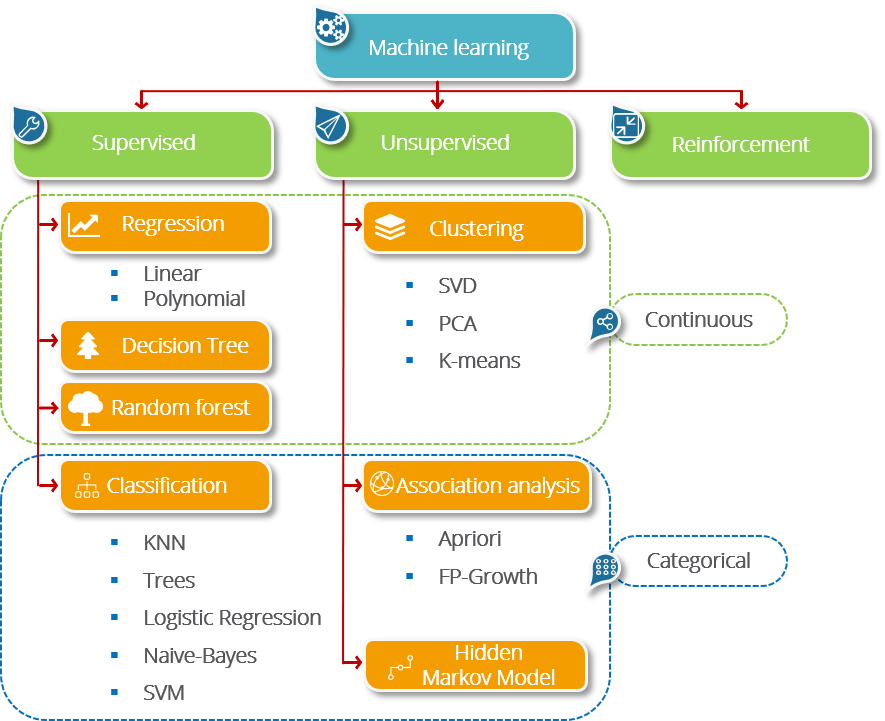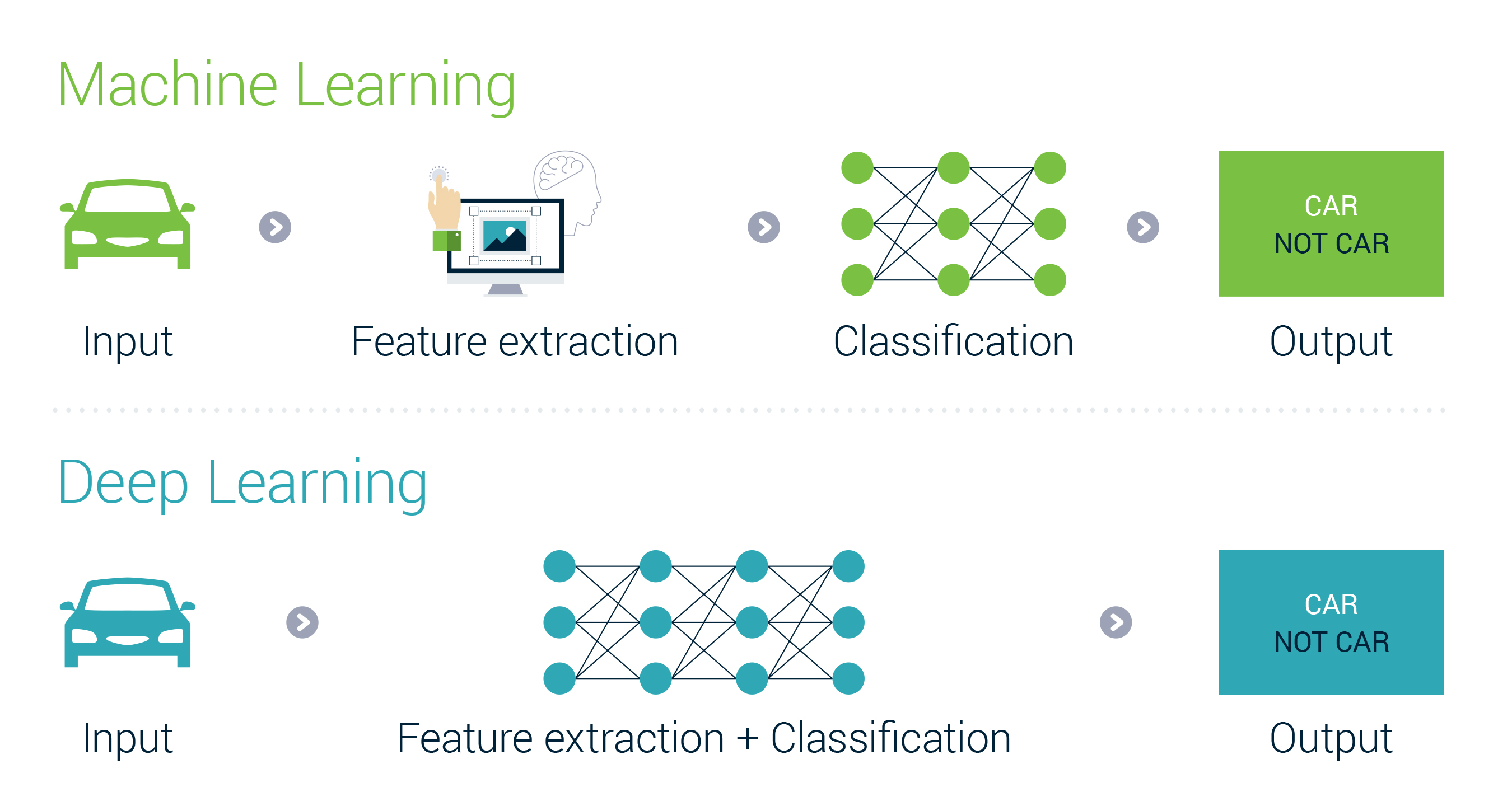It seems like everyone is looking to start a career in artificial intelligence and machine learning nowadays. That’s no surprise when you take into account the high salaries, a multitude of available job offers, and an opportunity to work with some of the hottest companies around. You’ll need to familiarize youself with popular machine learning interview questions.
At the same time, the fact that a lot of people are currently interested in machine learning as a career means that there are fewer jobs to go around. If you want to stand out from the crowd, you have to ace that machine learning interview. However, that’s easier said than done.
Luckily, help is at hand. We’ve compiled a list of some of the most frequently-posed machine learning interview questions and how to answer them. In other words, the ultimate machine learning interview cheat sheet!
25 Must-Know Machine Learning Interview Questions
General Interest ML Interview Questions
Show your interviewer you have your finger on the pulse by giving snappy – and above all accurate – answers to these common machine learning interview questions.
Q1. Tell Me About Some Interesting Machine Learning Papers You’ve Read Recently
Show that you’re not a run-of-the-mill candidate. You can do this by demonstrating a deep interest in the latest machine learning advancements. The field is moving forward at the speed of light. Make sure to keep up by subscribing to industry newsletters, reading relevant publications, and keeping abreast of the latest research.
Q2. Tell Me About Your Favorite Use Cases Of Machine Learning Models
It’s essential to demonstrate a strong interest in the implementation of machine learning. Make sure that you have a few examples to give should this question come up. Use cases for machine learning algorithms include decision trees, support vector machines, ANN, random forests, linear regression, and ridge regression, the Naive Bayes classifier, Bayesian nets, Hidden Markov Models, and clustering.


Q3. What’s Your Research Experience In Machine Learning?
Businesses hiring for machine learning positions are looking for the best candidates in the field. They will probably require proof of formal experience. Having research papers to your name will look extremely good on your resume, especially if they’re co-authored or supervised by big names in ML. Be sure to have a document presenting your ML-related publications and papers. If you don’t yet have any, prepare an explanation for your lack of formal research experience.
Q4. Where Do You Usually Source Your Datasets?
Someone with a deep interest in a machine learning career will have their finger on the pulse when it comes to sourcing great datasets. Show your interviewer how passionate and knowledgeable you are about your subject by being able to reel off lesser-known sources for awesome datasets. Besides, it’s a bonus point if you can cite a few that are directly related to the position you’re applying.
Programming Machine Learning Interview Questions
Q5. How Does Machine Learning Differ From Deep Learning?
You may think this is a pretty easy one, but it may come up anyway. Besides, it’s a good idea to have a snappy answer to hand just in case. The answer is that both are subsets of artificial intelligence. ML consists of algorithms that continually seek to interpret vast quantities of data and learn from it. On the other hand, deep learning layers algorithms in a neural network that is then able to make decisions for itself, much as a human would.


Q6. What Is The Difference Between Supervised And Unsupervised Learning?
If you’re applying for a job in machine learning, then you undoubtedly know this one. Besides, it won’t do you any harm if you can answer it clearly and succinctly. Supervised machine learning uses labeled data and aims to predict an outcome. Nonetheless, unsupervised machine learning uses unlabeled data and is not given any guidance. Rather like learning without a teacher: entirely possible, but more based on observation.


Q7. Tell Me Something About Reinforced Learning
You’d better be prepared for this question to come up. Reinforced learning is kind of the final frontier of machine learning. Additionally, it is a semi-supervised learning model which uses trial-and-error to train algorithms to reach a specific objective.
Q8. Can You Provide A Famous Example Of Reinforced Learning?
In asking you this, your interviewer is undoubtedly thinking of Lee Sidol, the best human Go player in the world. Google’s AlphaGo beat him in a best-of-five series. To accomplish this, the AlphaGo algorithm was provided with data on all the possible Go moves in existence and asked to determine the best course of action.
Q9. What’s The Difference Between Deductive And Inductive Machine Learning?
The difference between deductive and inductive machine learning is pretty simple to grasp. In deductive learning, you start from the conclusion. In inductive learning, you start with some examples and look to conclude them.


Q10. Tell Me About The “Netflix Prize” Competition
The Netflix Prize was a competition where streaming platform invited teams to come up with a better collaborative filtering algorithm aimed at predicting user ratings. BellKor’s Pragmatic Chaos team won the contest (and a cool $1,000,000) with an algorithm that improved on the former one by over 10%. Moreover, being familiar with the case will help demonstrate to your interviewer that you take a strong interest in machine learning and have been doing so for a while.
Q11. What’s The Difference Between Classification And Regression?
It’s important to know the difference between regression machine learning algorithms and classification machine learning algorithms to implement the right methodologies. This is why this question may come up among your ML interview questions. Put simply, the outcome variable in classification is categorical (or discrete), while that in regression is numerical (or continuous). Furthermore, classification predicts membership of a group, while regression predicts a response.
Q12. Tell Me Something About Kernel SVM
Quite simply, kernel SVM stands for kernel support vector machine. Additionally, it is the most common of a class of algorithms for pattern analysis.
Q13. Tell Me About Decision Tree Classification
Decision trees are a popular and powerful machine learning algorithm. A decision tree is a representation that enables you to classify examples. It breaks datasets up into smaller and smaller to create a literal “tree” with branches and nodes.
Q14. What’s A Neural Network Made Of?
As you know, the ultimate goal of artificial intelligence is to create machines able to reproduce human cognitive abilities. To this end, neural networks are modeled after the human brain and can perform deep learning. The human brain is made up of neurons. On the other hand, neural network is composed of perceptrons made up into a large network.
Q15. How Do Neural Networks Work?
This is a pretty complicated question, as there are many different types of the neural network. However, here’s a basic answer should it come up among your interview questions on machine learning. Artificial neural networks (ANN) use several different layers of mathematical processing to interpret the information they’re provided with. Artificial neurons are organized into layers; the input layer receives the information which the inner layers process.
Q16. Where can we use ANNS?
Artificial neural networks can be used to classify information, put data into clusters, and predict outcomes. Among their many uses, applications for ANNs include system identification and control, pattern recognition (such as face and object recognition), sequence recognition (such as text recognition), medicine (ANNs have been used in the past to diagnose certain cancers for example), data mining, automatic trading and finance, and spam filtering. The sky’s the limit!
Q17. What’s The Difference Between Data Mining And Machine Learning?
Data mining is applied to machine learning. It takes much of its inspiration and techniques from ML but is applied to a different end. Data mining is carried out on a specific dataset and with a specific aim in mind. The dataset in question is usually extensive or presents particular challenges. Moreover, the goal is to generate new insights or predict future observations.
General Machine Learning Interview Questions
You can have extensive knowledge of your subject and still be passed over by other candidates who turned out to be better at exposing their motivations and reasons for wanting to pursue a career in machine learning. What’s more, companies will want to know about exactly what you as a machine learning specialist can bring to their team.
Q18. How Can Your Machine Learning Skills Augment Our Company’s Revenue?
This is a complicated question to answer, and will very much depend on the kind of company you’re applying. Let’s say you’re looking to work for Netflix; you could simply answer the question by stating that by improving the platform’s recommendation algorithm, you’ll be improving user satisfaction and therefore increasing user retention in the long run.
The trick to answering this question correctly is to think about the company’s performance indicators ahead of time.
Q19. How Could We Improve Our Current Data Management?
When interviewers ask you this one, they’re trying to evaluate what kind of team member you’d make and how valuable you could be to the company. Listen carefully and attentively and try to impact feedback in a manner that’s both constructive and thoughtful.
Q20. Why Are You Interested In Working With Our Company In Particular?
This one is in no way specific to machine learning-related positions, but you’d do well to turn up to your interview with a solid answer. How will a position at this company fit in with your career path up till now? What particular skills can you bring to the job? And don’t forget the ultimate classic – where do you see yourself five years from now? Don’t miss the chance to show your recruiter that this application is part of a well-thought-out process for you and that you know where you’re going career-wise.
Tricky Machine Learning Interview Questions
So the recruiter has established that you know your stuff when it comes to the tech side of things and that your motivations for wanting to join their company are well-established. He or she is now going to try to trip you up. Be prepared!
Q21. What Are Your Main Strengths And Weaknesses?
We all hate this one. The temptation is to answer “I’m such a perfectionist! I just can’t keep myself from going the extra mile for my company.” Don’t do this! It sounds fake and insincere. Furthermore, your recruiter will see you coming a mile away.
Instead, identify a real weakness and how you’ve learned to work with it. Besides, this will show that you’re honest and self-aware.
Q22. Why Are You Seeking To Leave Your Current Company?
Yet again, honesty is the best policy here, but try to remain as positive as possible. Do not, in any case, badmouth your current company or say anything that could indicate you’re not a great team player. “I’ve really enjoyed my time with X. Moreover, I’m now looking to build on what I learned there with an exciting new challenge” will make you sound dynamic and enthusiastic – the kind of person anyone would want to work with.
Q23. What Do You Do In Your Free Time?
This one may be kind of unexpected, but recruiters ask it for a very good reason. They want to see what kind of person you are and what it will be like having you around on a day-to-day basis! Show you can contribute to an open and positive work culture by sharing your hobbies, however quirky or unusual they may be.
Q24. Are You A Good Team Player?
This one is quite tricky, as great tech employees are well-versed in both highly-focused unsupervised work and collaboration. A good answer could be something along the lines of, “I enjoy working with a team but also think that solo concentration time is valuable.”
Q25. What Kind Of Salary Are You Expecting?
This can be a difficult question to answer when you don’t know what the company’s budget range is. If this is the first interview, the best thing to do is deflect the question and suggest that you’ll figure it out later, thus avoiding disqualifying yourself by giving a number that’s too low or too high.



























